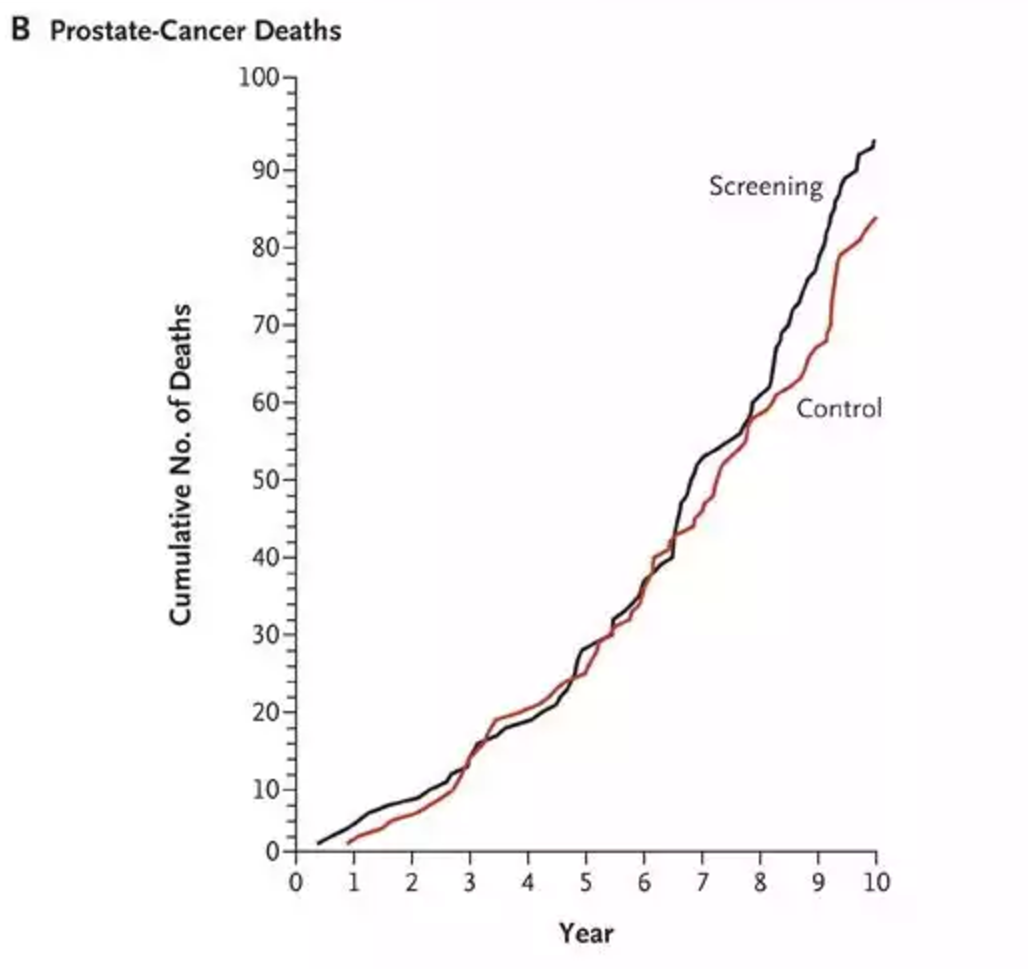PSA Screening for Prostate Cancer Gets a Shot in the Arm
/When we talk about screening tests, we almost always end up at the same place. Are the lives saved from screening worth the suffering of false-positive diagnoses and unnecessary testing?
For the video version, click here.
But for PSA screening for prostate cancer, the debate never got that far. That’s because the largest US randomized trial of prostate cancer screening, called the PLCO trial, showed no benefit of screening in terms of prostate-cancer mortality. Note the overlapping lines here.
No need for debate – it just didn’t work.
Largely due to this trial, in 2011 the United States Preventative Services Task Force recommended against routine screening for prostate cancer by the PSA test, giving the practice a "D" rating.
But there was another large trial of PSA screening for prostate cancer conducted in Europe, and that one actually did show a beneficial effect of screening on prostate cancer mortality.
Why the different results?
Socialism!
Well, the Prostate, Lung, Colorectal, and Ovarian Cancer Screening Trial (PLCO) was done in the US and the European Randomized Study of Screening for Prostate Cancer (ERSPC) was done in Europe. The PSA cutoff and frequency of screening was higher in the US study.
But they differed in one way that isn't readily apparent from this table. In the US, during the PLCO trial, individuals in the "no screening" arm were getting screened anyway as part of their usual care. In fact, some estimates suggest as many as 90% of the individuals in the no-screening arm had at least one PSA test during the trial. Maybe it's not the differences between Europe and the US that led to these disparate results – maybe it's because the intensity of screening was so much higher in the control group in the US study.
Enter Ruth Etzioni and her team from the Fred Hutch Cancer Center with this article, appearing in the Annals of Internal Medicine.
They wanted to square the results of the US and European trials. And they found that by accounting for that extra screening in the control arm of the US trial, they could. The implication? PSA screening for prostate cancer avoids prostate cancer deaths.
Now, notice I didn't say "saves lives". Because neither study showed an effect of screening on overall mortality. I asked Dr. Etzioni about that. She pointed out that only 2-3% of men will die from prostate cancer, so moving the needle on overall mortality is going to be really difficult:
“So there is a divided camp on this, there are people who feel that if the intervention doesn’t change or cause mortality significantly then it’s not worthwhile. But there are many causes of death, and if we have interventions that move each cause of death by 20-30% then when taken together they will make a difference.”
Does this data support broadening PSA screening? To me, this paper convincingly shows that PSA testing is better than a policy of zero PSA testing. But that’s not current policy. The paper also shows that a policy of universal PSA testing is really no better than our current slapdash approach.
Putting it together, it seems clear that there is a group of people for whom PSA testing makes sense – but it's definitely not everyone. Dr. Etzioni agreed:
“I don’t think that we should be recommending against screening, but we do have to have our eyes wide open about the fact that screening is somewhat of a broad brush approach... And so there is no one-size-fits-all and I think what I would like to do is to instead of seeing a policy, I would like us all to reach a consensus on the key pieces of information that we agree on that all men should know.”
The most important piece of information? The individual risk of false-positive diagnoses and unnecessary procedures. In other words, we now have to have the debate about PSA screening that we have had with every other screening test.





